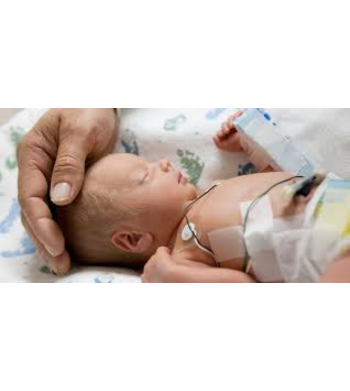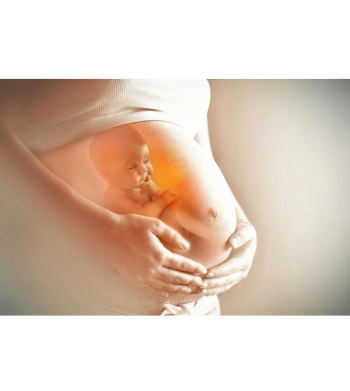Since a baby's lungs are small, only small puffs of air are needed to fill them. Repeat 30 compressions and 2 breaths until help arrives. If you still have not called 911 because you are alone and do not have a cell phone, call 911 after 5 sets of compressions and breaths. Keep doing CPR until help arrives.
What are the 5 steps of newborn resuscitation?
Record all procedures on the monitoring sheet.
1 - Stimulate the neonate by drying....
2 - Clear the airway....
Figure 10.1 - Head position for clearing the airway.
3 - Stimulate the neonate....
4 - Clamp and cut the cord....
5 - Perform bag-mask ventilation (room air)
 Baby Receiving and Resuscitation
Baby Receiving and Resuscitation
 Comprehensive Preterm Care
Comprehensive Preterm Care
Vaccinations
Premature babies who are in stable health can receive vaccines based on their age.
Feeding
Premature babies need more nourishment to catch up to full-term babies.
Family support
The mother and family should be involved in the baby's care. This includes education, counseling, peer support, and home visits from trained health care providers.
Sleep
Premature babies sleep more than full-term babies, but for shorter periods. All babies should sleep on their backs to reduce the risk of sudden infant death syndrome (SIDS).
Comprehensive preterm care includes a variety of interventions for the mother and baby, including:
Antenatal care
To reduce the risk of preterm labor, you can:
• Avoid tobacco, alcohol, and other substances
• Eat a nutritious diet
• Start prenatal care in the first trimester
• Attend all prenatal care appointments
• Reduce stress
• Wait at least 18 months between pregnancies
Treatments for preterm labor
Treatments like antenatal steroids and tocolytic treatments can help protect the baby from breathing difficulties, infection, and neurological impairment.
Immediate care for the baby
This includes:
• Intubation for babies who aren't pink and active at birth
• Maintaining a neutral head position
• Supporting ventilation with continuous positive airway pressure (CPAP)
• Chest compression
• Drugs like adrenaline, sodium bicarbonate, and dextrose
Nursery care
Preterm babies often need to stay in a special nursery unit at the hospital, such as a neonatal intensive care unit (NICU).
This is for informational purposes only. For medical advice or diagnosis, consult a professional Dr. Shalini Agarwal
Babies should get a number of vaccines to protect them from serious diseases and complications:
• Birth: BCG, Hep B1, and OPV
• 6 weeks: Pentavalent 1, Rotavirus, and IPV
• 10 weeks: Pentavalent 2, Rotavirus, and IPV
• 14 weeks: Pentavalent 3, Rotavirus, and IPV
• 12 weeks: 6-in-1 vaccine, Pneumococcal vaccine, and Rotavirus vaccine
• 16 weeks: 6-in-1 vaccine and MenB vaccine
• 1 year: Hib/MenC vaccine, MMR vaccine, and Pneumococcal vaccine
Babies are most at risk of diseases, and their immune systems learn the most from vaccines during this time. Vaccines help protect children from serious diseases and complications, and lower the chance of spreading a disease.
This is for informational purposes only. For medical advice or diagnosis, consult a professional Dr. Shalini Agarwal
 vaccination
vaccination
 Outborn Patient Care & Inborn Patient Care
Outborn Patient Care & Inborn Patient Care
Outborn infants, or those born outside of tertiary centers, are at higher risk of mortality and morbidity than inborn infants, or those born in tertiary centers. This is especially true for extremely preterm infants, who require specialized equipment and care.